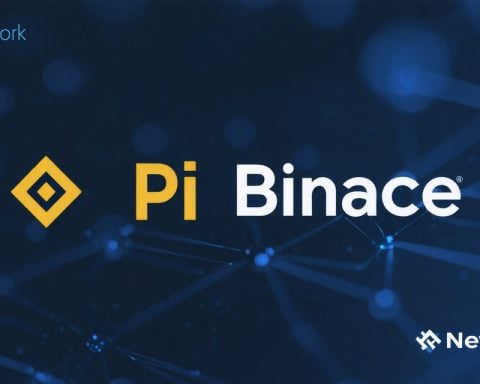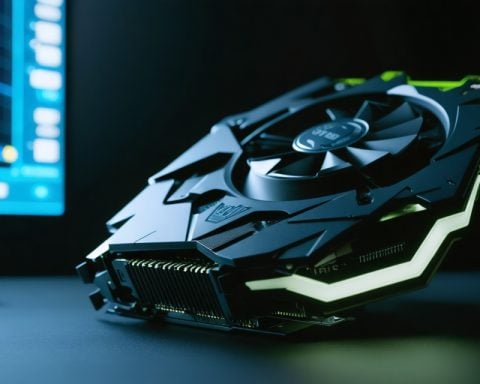- Quantum computing holds the promise of solving complex problems exponentially faster than classical computers, with IonQ leading the charge using trapped-ion qubits.
- IonQ’s quantum processors have gained significant attention, resulting in a remarkable share price increase of over 200% in a year.
- The company has secured notable contracts, including one with the U.S. Air Force, and is expanding into new markets like Busan, South Korea.
- While revenue is increasing, IonQ faces profitability challenges, reporting a significant net loss last quarter.
- Investors are focused on the upcoming fourth-quarter results, anticipating revenues between $7.1 million and $11.1 million.
- Analysts express cautious optimism, maintaining a “Moderate Buy” rating, with IonQ’s future moves expected to potentially reshape the quantum landscape.
Imagine a future where computers solve in seconds what would take today’s fastest machines thousands of years. This is the tantalizing promise of quantum computing, and it’s not just science fiction. Leading this technological revolution is IonQ, a company at the forefront of transforming theoretical potential into commercial powerhouses. With its innovative use of trapped-ion qubits, IonQ’s cutting-edge quantum processors are drawing attention, and rightfully so.
In recent years, IonQ’s shares have skyrocketed, leaving early tech comparisons in the dust. The firm’s spectacular performance—over 200% gain in a year—stoked the flames of investor interest, despite the early 2025 dip. Yet, this isn’t mere hype. IonQ’s strides forward, such as securing a lucrative contract with the U.S. Air Force and expanding into new markets like Busan, South Korea, highlight its tangible momentum.
However, IonQ isn’t without its challenges. While revenues soar, profitability remains elusive with a significant net loss reported last quarter. The financial dance continues as the company prepares to announce its fourth-quarter results. Investors are keenly awaiting updates, with anticipated Q4 revenue figures between $7.1 million and $11.1 million, setting the stage for a bullish full-year forecast.
The analyst community keeps a watchful eye, and their sentiment hints at cautious optimism. With a consensus rating of “Moderate Buy,” there’s a sense that IonQ’s next moves could redefine the quantum landscape.
For those with an eye toward the future and a taste for innovation, IonQ’s narrative is compelling. As Feb. 26 approaches, all eyes are glued to what could be a defining moment in the march toward a quantum future. Could this earnings call signal the dawn of a new tech era? Investors and tech enthusiasts alike are poised to find out.
The Quantum Computing Revolution: Will IonQ Usher in a New Tech Era?
How-To Steps & Life Hacks: Navigating Quantum Computing
1. Educate Yourself: Begin by understanding the basics of quantum computing and the role of qubits. Resources like IBM Quantum are invaluable for gaining foundational knowledge.
2. Analyze Market Players: With companies like IonQ, Google, and IBM leading the quantum charge, compare their technology, strategies, and market positions.
3. Invest Wisely: If considering investing, research analysts’ reports and understand market trends. Platforms like Bloomberg offer insights into stocks and financial forecasts.
4. Stay Updated: Follow industry news through publications like The Verge to remain informed about the latest breakthroughs and business developments.
Real-World Use Cases
Quantum computing has the potential to revolutionize various industries:
– Pharmaceuticals: Accelerating drug discovery processes by simulating molecular interactions.
– Cryptography: Enhancing security protocols and potentially breaking traditional encryption methods.
– Supply Chain Optimization: Helping companies like DHL and Maersk improve logistics and efficiency.
Market Forecasts & Industry Trends
The quantum computing market is projected to grow dramatically, reaching approximately $65 billion by 2030 (Source: MarketsandMarkets). This expansion is fueled by increasing investments from tech giants and rising demand for solutions that classical computers cannot efficiently solve.
Reviews & Comparisons
IonQ is often compared to its peers, offering distinct advantages such as:
– Trapped-Ion Technology: Provides stability and coherence, reported by experts at MIT Technology Review as one of the more promising types of qubits.
However, companies like Google and IBM are also advancing rapidly with their superconducting qubit technologies.
Controversies & Limitations
1. Scalability: One challenge is scaling quantum computers to solve large, practical problems, an area where limitations in qubit distance and error rates continue to pose significant hurdles.
2. Profitability: Despite technological advances, profitability remains distant, as seen in IonQ’s current financials.
Features, Specs & Pricing
– IonQ’s Quantum Processors: Characterized by their scalability and high-fidelity gates, IonQ’s qubits are noted for superior error rates.
– Pricing: While specific costs are undisclosed, pricing structures often depend on usage and access via cloud platforms.
Security & Sustainability
Quantum computing could both threaten and enhance cybersecurity. It’s crucial to develop quantum-resistant cryptographic methods. On sustainability, the energy consumption of next-gen quantum computers is a concern, urging the need for eco-friendly developments.
Insights & Predictions
Experts predict that within a decade, quantum computers will start solving specific problems that are currently infeasible. This will particularly impact sectors like logistics, finance, and pharmaceuticals.
Tutorials & Compatibility
For beginners, platforms like IBM Quantum Experience offer free tools and learning modules to experiment with actual quantum circuits. Compatibility with classical systems remains an ongoing challenge.
Pros & Cons Overview
Pros:
– Potentially transformative effects across industries.
– Pioneering advancements in computational power.
Cons:
– High initial costs and significant R&D investments.
– Current software and infrastructure limitations.
Conclusion and Quick Tips
To capitalize on the quantum leap:
– Diversify Investments: Hold a balanced portfolio, including traditional tech stocks alongside emerging quantum leaders.
– Engage in Continuous Learning: Quantum computing is rapidly evolving—stay informed through courses and industry conferences.
With the promise of unprecedented computational abilities, quantum computing continues to capture the imagination and investments of forward-thinkers worldwide. Keep your eyes on IonQ as it vies to shape this exciting frontier.



















